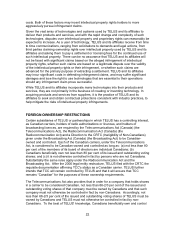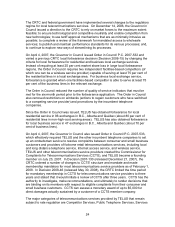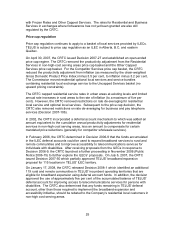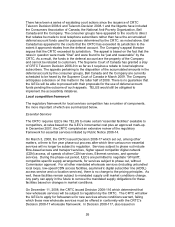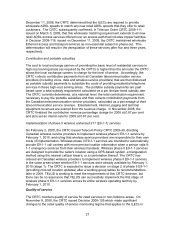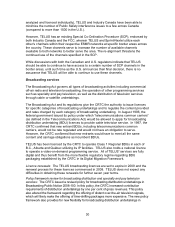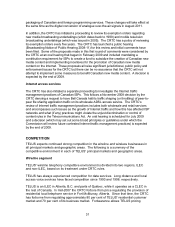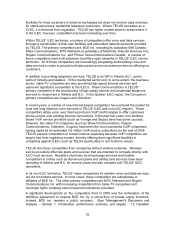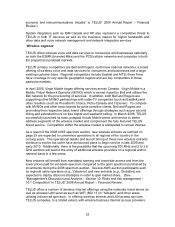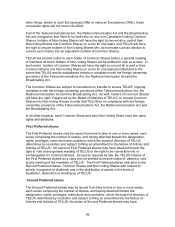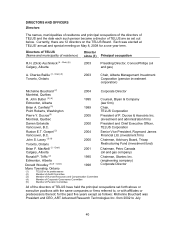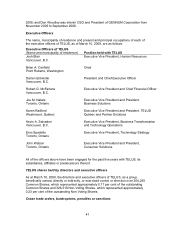Telus 2008 Annual Report Download - page 32
Download and view the complete annual report
Please find page 32 of the 2008 Telus annual report below. You can navigate through the pages in the report by either clicking on the pages listed below, or by using the keyword search tool below to find specific information within the annual report.flexibility for most customers in forborne exchanges but does not remove caps on prices
for stand-alone basic residential telephone customers. Where TELUS competes as a
CLEC, it is forborne from regulation. TELUS has higher market share in areas where it
is the ILEC; however, competition has been increasing over time.
Within TELUS’ ILEC territories, a number of competitors offer voice and data services
through a combination of their own facilities and unbundled network elements provided
by TELUS. The primary competitors are: BCE Inc. including its subsidiary Bell Canada,
Shaw Communications, MTS Allstream (a subsidiary of Manitoba Telecom Services Inc),
Rogers Communications Inc., and Primus Telecommunications Canada. A number of
these competitors have built extensive local fibre optic networks in TELUS’ ILEC service
territories. All of these competitors are increasingly integrating and bundling voice and
data services in order to provide both discounted and more extensive service offerings to
customers.
In addition to providing telephony services, TELUS is an ISP in Alberta, B.C., and in
parts of Ontario and Québec. In the residential sector and, to some extent, the business
sector, cable-TV companies are also providing high-speed Internet services and
represent significant competition to the ILECs. Shaw Communications is TELUS’
primary competitor in the provisioning of high-speed Internet and residential telephone
services to consumers in Alberta and B.C. In the Québec ILEC region, the Company’s
primary competitors are Cogeco and Videotron.
In recent years, a number of new Internet-based competitors have entered the market for
local and long distance voice services in TELUS’ ILEC and non-ILEC regions. These
competitors utilize voice over Internet protocol (VoIP) technologies to offer customers
phone service over existing Internet connections. In the past few years, non-facilities
based VoIP service providers (such as Vonage and Skype) have had some success.
However, the cable-TV companies (such as Shaw Communications, Rogers
Communications, Videotron, Cogeco) have been the most successful VoIP competitors
having captured an estimated 2.6 million VoIP service subscribers by the end of 2008.
TELUS expects competition to remain intense especially because VoIP competitors are
largely free from regulatory burden, thereby offering them significant flexibility in
competing against ILECs such as TELUS (particularly in non-forborne areas).
TELUS also faces competition from companies without wireline networks. Wireless
service providers offer rate plans and services that are intended to compete directly with
ILEC local services. Resellers of primary local exchange services and smaller
competitors in niches such as dial-around plans and calling card services have been
operating in Alberta and B.C. for several years and also compete with TELUS’ ILEC
operations.
In its non-ILEC territories, TELUS’ major competitors for wireline voice and data services
are the incumbent carriers. In most cases, these competitors are subsidiaries or
affiliates of BCE Inc. The other primary competitors are MTS Allstream and Rogers
Communications Inc. with increasing competition from cable-TV companies and
municipal hydro company owned telecommunications providers.
A significant development on the competitive front in 2008 was the termination of the
definitive agreement to acquire BCE Inc. by a consortium of private equity investors.
Instead, BCE Inc. remains a public company. (See “Management’s Discussion and
Analysis – Section 1. Introduction, performance summary and targets - 1.2 Canadian
32


